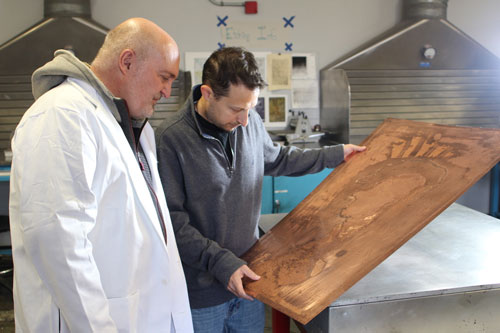November 22, 2019
K-State professor selected to speak at the Metropolitan Museum of Art

Jason Scuilla, professor of art and area coordinator in printmaking at Kansas State University, has been selected to present and share his research as a part of a new major exhibition, "The Renaissance of Etching," at the Metropolitan Museum of Art, or Met, in New York City on Friday, Nov. 22.
This exhibition traces the invention and early development of the art of etching. To coincide with this exhibition, Scuilla and two other master printmakers will join the Met curators to speak about tech innovations to the field of contemporary etching. He will be the only university professor to present on this panel.
"Professor Jason Scuilla's inclusion in this international symposium on early and contemporary etching techniques signifies both the prominence of his creative activity and the importance of his technical research in his field," said Matthew Gaynor, professor and Lindy E. Bell department head of art. "It is a testament to the quality of creative work being done in the Department of Art at K-State."
Scuilla's project was a 2017 recipient of the National Endowment for the Arts grant. In this project, Scuilla has partnered with co-principal investigator Stefan Bossmann, university distinguished professor of chemistry, to connect art and chemistry to create a more sustainable printing process. Their team aspires to transform printmaking through chemical innovation. Their research focuses on developing and refining electrochemical etching processes and green bio-solvents, to empower artists to create prints in a more effective and safe manner. They are changing the way prints are made while maintaining equal or greater quality.
Scuilla said he is excited to share this collaborative research with this audience.
"By combining innovative and experimental technology with traditional printmaking techniques, we can improve not only the quality but also the safety of fine art etching. This is a great opportunity to share my prints, and the research of our team, with a wider audience," Scuilla said.
Printmaking materials and processes can be harmful both to the printmaker and the environment. Their team endeavors to use less toxic, and more accessible and sustainable materials in this new printing process.
"We hope to extend the life of printmakers by 10 years," Bossmann said.
During the renaissance period, arts and science were much more connected. With this research, Scuilla and Bossmann hope to help students discover a more holistic approach to the two disciplines.
